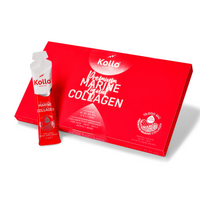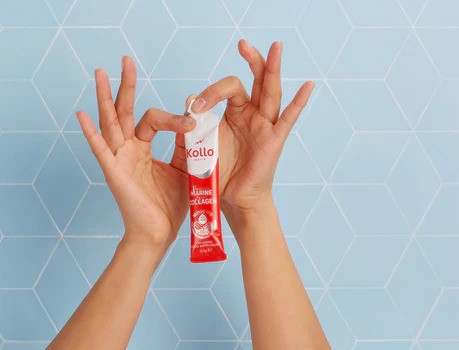Bovine Collagen or Marine Collagen?

Should I choose bovine collagen or marine collagen for my skin?
Whether bovine collagen or marine collagen, the collagen in your supplements comes from an animal. It is a by-product of the meat industry, extracted from parts of the animals that are not usually used as food. Think bones, hides, tendons, skin and scales. There are many types of collagen, each of which is more abundant in certain parts of our bodies.
When your goal with collagen supplements is to experience the benefits for your skin, you might question which type of collagen is best. This question may start as a comparison of collagen from different animals. But it will eventually lead to considering the collagen type you need.
So, without further ado, let’s explore the question: should I choose bovine collagen or marine collagen for my skin?
What are the different collagen types?
For the uninitiated, collagen is generally considered to be a single entity. But there are actually 28 known collagen types, and there may yet be more for us to discover. This is a lot to consider, but there are three main collagen types that are particularly important for our bodies. These are the ones you need to concern yourself with when exploring the specific benefits they will be best at delivering.
The amino acids you need to produce these collagen types can come from various healthy proteins. They can enter to your diet by eating things like organ meats, cartilage and boned fish. But these things are not part of a typical diet for the majority of people.
As such, collagen supplements are a popular alternative. In fact, the amino acids are uniquely abundant in supplements. Moreover, they have undergone processes to make it very easy for your body to absorb and use them to create new collagen.
The three main types of collagen are as follows:
-
Type I Collagen (found in skin, tendons, ligaments, bones, teeth, arteries and organs)
-
Collagen Type II (primarily found in cartilage)
-
Type III Collagen (found in the skin, blood vessels and muscles)
Let’s look at these in a little more detail.
Type I collagen
Type I makes up the majority of the body’s collagen. In fact, as much as 90% of the collagen in your body is type I. It consists of very densely packed fibres. This collagen gives structure to many parts of the body, and your skin is a particularly important one. With collagen so prevalent in the skin, its decline can lead to very visible issues. These include loose, sagging skin, the formation of fine lines and wrinkles, thinning of hair and brittle nails.
Type II collagen
Type II collagen consists of more loosely packed fibres, giving it the elasticity required in cartilage. This provides cushioning for your joints, promoting comfortable movement and healthy function to support the skeletal system. Your cartilage must bear mechanical stress and absorb shock. This is particularly important for people who like to engage in exercise and sport. So type II collagen should be the main focus for people who want to improve their joint health through collagen supplementation.
Type III collagen
This is the second most abundant type of collagen in the body. It supports the structure of arteries, muscles and organs throughout your body. You will find it in reticular fibres like bone marrow, and it is helpful in maintaining strength and good health in the gut, vascular system and bones.
Bovine collagen or marine collagen for the skin
As the analysis above shows, the most important collagen for your skin is type I. As you get older, the natural levels of this collagen in your skin decrease. This decline only gets worse with things like:
-
Exposure to sunlight
-
Smoking
-
Stress
-
Poor diet
-
Excessive alcohol consumption
If you are approaching or in midlife and any of the above applies to you, chances are you are experiencing the early signs of ageing. In your skin, this amounts to fine lines and wrinkles, skin losing its elasticity, poor skin hydration and a general lack of vibrancy. It may feel like you simply have to accept these things now. But you can make changes to the lifestyle choices listed above and engage in a good skincare routine to make a difference. If you include taking the right collagen supplement, you could restore some of the youthful appearance of your skin.
One of the key considerations in choosing the right collagen supplement for your skin is to know where that collagen comes from.
Bovine collagen
This comes from the connective tissues, cartilage, bones and hides of cows. Bovine collagen usually consists of a mixture of type I and type III collagen. This gives it quite a broad focus in terms of the benefits it can bring to your body. But it means the type I collagen that is so important for your skin is not available in such high concentrations in these supplements.
With bovine collagen, there is a chance you will experience some of the benefits to your skin, but it may not be the best choice. Generally, speaking, the benefits of bovine collagen primarily relate to bones, joints and organ health. You can also experience these results from marine collagen, as well as the many benefits for your skin which we will outline in the next section.
Marine collagen
Marine collagen comes from the skin and scales of fish and is almost exclusively type I collagen. It is also known to be the collagen that bears the strongest molecular similarity to human collagen. Studies have shown it to be more bioavailable than other forms of animal collagen. What this amounts to is that it will deliver maximum benefit to your skin. It will also be very easy for your body to absorb and use the amino acids it receives from a marine collagen supplement.
Marine collagen supplements supply collagen peptides that almost entirely come from type I collagen. As such, they are a potent source of skin-boosting, rejuvenating nutrients. They will equip your body with the fuel it needs to stimulate and support the creation of new collagen. This will restore optimal health to your skin, so the benefits you could experience include:
-
Better skin hydration
-
Improved firmness and elasticity of skin
-
Restoration of that youthful glow
-
A reduction in the appearance of fine lines and wrinkles
-
Better health in your hair and nails
Other considerations for the question of bovine collagen or marine collagen
When exploring this comparison for the right collagen supplement for you, there are some other things you should know.
Purity
As a by-product of the meat industry, collagen purity depends on the farming techniques used for the animals. In many cases, cattle farming involves the use of hormones, antibiotics and GMO crops. These help keep costs down while promoting growth in the animals. Unfortunately, studies have shown that the use of these things can contaminate the meat. Toxins like heavy metals and other chemicals may be present. These things can then get into the collagen peptides that make up your supplement.
Fish farming generally uses far less of these chemicals, particularly in aquaculture farms. This means the purity and integrity of the meat and the collagen is higher, with far fewer contaminants that might do harm to your body over the long term.
Type of supplement
When choosing between bovine collagen or marine collagen, you should look at the types of supplement. Generally speaking, you are choosing between a powder, a liquid or a tablet. Bovine collagen is usually offered in a powder or a tablet, though some liquids are available. Marine collagen, on the other hand, is widely available in all three forms.
It is our strong belief that liquid collagen supplements are the most effective. Powders require mixing with other drinks or food, which can be time-consuming. Moreover, you are not guaranteed a consistent daily dosage due to the uneven distribution of the powder within the tub. Tablets, meanwhile, are only able to contain a limited dosage because of their size. They also put more strain on your digestive system to break them down.
Liquids are easy to drink and have maximum bioavailability because they need no digestion. They supply the collagen in a high, consistent dosage in every serving.
Complementary ingredients
You should always check what other ingredients are in your collagen supplement. A good one will contain nutrients known to assist the processes by which your body creates new collagen. These include B vitamins, vitamin C and l-lysine.
You should also look out for ingredients like sugar or artificial flavourings. These may not be good for your health, and can even interfere with the effectiveness of the collagen once it enters your body.
Kollo: answering the question of bovine collagen or marine collagen
Kollo is a premium-grade marine collagen supplement. We have won many awards and received thousands of 5-star reviews. The Naticol marine collagen has high purity and superb bioavailability. Meanwhile, the liquid suspension ensures maximum convenience and easy absorption into your bloodstream.
The formula contains 10 grams of collagen peptides. We fortify it with B vitamins, vitamin C and l-lysine, and it is sugar-free with delicious natural flavourings for a tasty tropical drink each day.
If you would like to learn more about why Kollo is a fantastic option for your skin, please explore our blog. Read some of the articles about collagen and its benefits for anti-ageing. There is a lot to learn, so we have supplied a wealth of information on our website.
If you have any further questions, please don’t hesitate to get in touch and we will answer them.


















